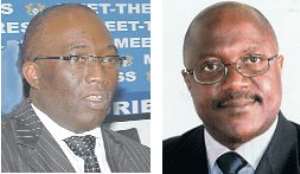
The assets of some prominent Ghanaians which were confiscated by various military regimes are to be returned to their owners before the end of this year.
Highly placed sources told the Daily Graphic yesterday that the Office of the President was finalising the list of assets to be handed over to the affected families, including those of a former Head of State, the late General I. K. Acheampong.
Others whose property are to be returned include General Robert Kotei, Squadron Leader George Tagoe, S.K. Kpegah, E.A. Amoah, the owner of Association International School, Commander J.C. Addo and Major Kwame Asante.
The other prominent personalities are J.K. Siaw, Kowus Motors, among others.
More than 100 of those assets are expected to be released as a result of recommendations from the Confiscated Assets Committee of the National Reconciliation Commission (NRC).
As a result of those recommendations, 1,551 individuals have already received GH¢952,297.52, being compensation for atrocities and human rights abuses they suffered under military regimes.
More people are expected to benefit from the compensation package which began two years ago.
According to the sources, the return of the assets would be on a “where is as is basis”, meaning “you will take it in whichever condition you find it”.
However, the sources indicated that compensation might be paid to those whose properties had been sold and totally transformed.
They further disclosed that the full list of beneficiaries would be published in the dailies next week, pointing out that the Attorney-General would implement the deconfiscation process of beneficiaries.
Under the deconfiscation process, beneficiaries will be asked to provide some basic information, such as proof of identity, letters of administration or will, in the instance where the original owners are dead.
In December 2001, the Parliament of Ghana passed the National Reconciliation Commission Act, 2002, (Act 611) which came into force on January 11, 2002 when it was gazetted.
The goal of the commission, as expressed in the Long Title to Act 611, was to seek and promote national reconciliation among the people of this country by recommending appropriate redress for persons who had suffered any injury, hurt, damage, grievance or who had in any other manner been adversely affected by violations and abuses of their human rights arising from activities or inactivities of public institutions and persons holding public office.
The commission comprised Mr Justice Kweku Etrew Amua-Sekyi, a retired Supreme Court judge (now deceased), Chairman; the Most Reverend Charles Gabriel Palmer-Buckle, then Catholic Bishop of Koforidua; Maulvi Abdul Wahab Bin Adam, the Ameer (Head) and Missionary in Charge of the Ahmadiyya Muslim Mission; Professor Florence Abena Dolphyne, a former Pro Vice-Chancellor of the University of Ghana; Lt Gen Emmanuel Alexander Erskine, the First Force Commander of the United Nations Interim Force in Lebanon (UNIFIL).
The others were Dr (Mrs.) Sylvia Awo Mansah Boye, a former Registrar of the West African Examinations Council; Mr Christian Appiah Agyei, a former Secretary-General of the Trades Union Congress (Ghana); Uborr Dalafu Labal II, the Paramount Chief of the Sanguli Traditional Area, Northern Region, and Professor Henrietta Joy Abena Nyarko Mensa-Bonsu, Associate Professor, Faculty of Law, University of Ghana, with Dr Kenneth Agyemang Attafuah, the then Director of Public Education and Anti-Corruption at the Commission on Human Rights and Administrative Justice, as the Executive Secretary.
Story by Mabel Aku Baneseh




 "I can now see clearly with my two eyes, thanks to the generosity of Afenyo-Mark...
"I can now see clearly with my two eyes, thanks to the generosity of Afenyo-Mark...
 Amansie Central: Violent rainstorm causes havoc at Jacobu; one dead
Amansie Central: Violent rainstorm causes havoc at Jacobu; one dead
 Renaming Ho Technical University after Ephraim Amu is illegal – Minority slams g...
Renaming Ho Technical University after Ephraim Amu is illegal – Minority slams g...
 Gomoa Akotsi: Truck crashes into police vehicle, one dead, several officers inju...
Gomoa Akotsi: Truck crashes into police vehicle, one dead, several officers inju...
 Election 2024: Power outages will affect NPP – Political scientist
Election 2024: Power outages will affect NPP – Political scientist
 NPP is 'a laughing stock' for luring 'poster-stickers', 'noisemaking babies' wit...
NPP is 'a laughing stock' for luring 'poster-stickers', 'noisemaking babies' wit...
 Dumsor: Matthew Opoku Prempeh must be removed over power crisis – IES
Dumsor: Matthew Opoku Prempeh must be removed over power crisis – IES
 PAC orders WA East DCE to process requests from their MP
PAC orders WA East DCE to process requests from their MP
 Defectors who ditched Alan’s Movement to rejoin NPP were financially induced – A...
Defectors who ditched Alan’s Movement to rejoin NPP were financially induced – A...
 Dumsor: Akufo-Addo has taken Ghanaians for granted, let’s organise a vigil – Yvo...
Dumsor: Akufo-Addo has taken Ghanaians for granted, let’s organise a vigil – Yvo...
